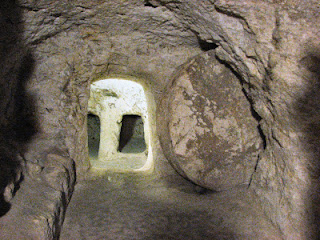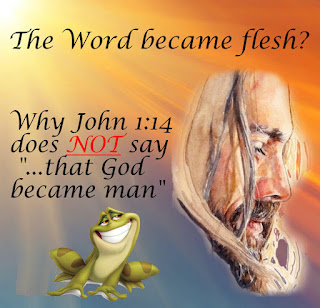What did Jesus mean when he said in John 10:30, “I and the Father are one”.
Trinitarians and those who believe in the “deity
of Christ” take a phrase or a sentence from the Gospel of John and claim “this
shows Jesus is God”. But such claims either ignore or refuse to believe the
author of the Gospel of John, who told us directly the reason he recorded the
signs that Jesus did. The author did not write so that we would believe that
Jesus is God, rather that we would believe that “Jesus is the Messiah, the Son
of God, and that believing we might have life in his name” (20:30-31).
In the
Gospel of John, Jesus tells us that the Father is the only true God, and Jesus describes
himself as the Messiah whom God sent (John 17:1-3, cf. 3:16).
So, who should we believe, Jesus and the
author of the Gospel of John, or someone who believes in the “deity of Christ”?
We are better off believing Jesus and the author of the Gospel of John, and not
a Trinitarian who tells us he knows better than the author why the author wrote
his Gospel.
What did Jesus mean when he said in John
10:30, “I and the Father are one”.
Jesus didn’t mean that he was the
same essence as God, but that he was one in will and purpose
with God.
The word “one” is used in other places in the
Gospel of John to mean a unity of will and purpose,
not of essence. For instance, John 17:11:
“And I am no longer in the world, but they are
in the world, and I am coming to you. Holy Father, keep them in your name,
which you have given me, that they may be one (e]n,, same word as John 10:30) even as we are
one.”
And John 17:20-23:
"I do not ask for these only, but also
for those who will believe in me through their word, that they may all be one
(e]n), just as you, Father, are in me, and
I in you, that they also may be in us, …. The glory that you have given me I
have given to them, that they may be one (e]n) even as we are one (e]n), I in
them and you in me, that they may become perfectly one (e]n)…”
Jesus isn’t praying that everyone would be of
the same essence as God. The context of Jesus’s language in the Gospel of John
of being “one” with God is not a claim of essence, but a unity of purpose.
Paul used the same language and idea in
referring to himself and Apollos: “He who plants and he who waters are one
(e]n, same word as John 10:30), and each will
receive his wages according to his labor” (1 Cor. 3:8). Paul and Apollos were
one in purpose, not in essence.
We use this type of language today: “My wife
and I are of the same mind”. That doesn’t mean that my wife and I share a brain
(if we did, I’d be a lot smarter), but that we have the same attitude or
purpose on an issue.
Even the Swiss reformer John Calvin did not
interpret “I and the Father are one” the way the catholic “church fathers” did,
(yes, Protestant Christian, your interpretation is Catholic). Here is Calvin:
“The ancients made a
wrong use of this passage to prove that Christ is the same essence (ὁμοούσιος) with the Father. For Christ does not argue
about the unity of substance, but about the agreement which he has with the Father, so that whatever is done by Christ will be
confirmed by the power of his Father." Calvin, John. "Commentary on John 10:30".
There is another important point to
make about the context of Jesus's statement to be “one with the Father”. John 10
follows John 9. In John 9 a blind man who received sight was excommunicated
from fellowship by religious leaders. In John 10, Jesus is saying to people
like that formerly-blind-then-healed-man: “Don’t worry, you are part of my flock. I
am the good shepherd. I will keep you in the flock. My God (my Father), who is
greater than all will keep you in the flock. We (I the Messiah and God the
Father) are together in purpose about this. “I and the Father are one”. Nobody
can excommunicate you. Nobody can take you out of my hand. The religious
leaders have no power over you. You are safe.”
Expect to be rejected by the religious establishment for your belief in God and the human Messiah Jesus. But those in the religious establishment are not the Good Shepherd, who laid down his life for the sheep (John 10:11). They are thieves, robbers and hirelings. "Fear not, little flock, for it is your Father's good pleasure to give you the kingdom."
Check out the One God Report Podcast
Blessings in Messiah Jesus, the firstborn from the dead, the beginning of God’s creation!
Blessings in Messiah Jesus, the firstborn from the dead, the beginning of God’s creation!


Comments